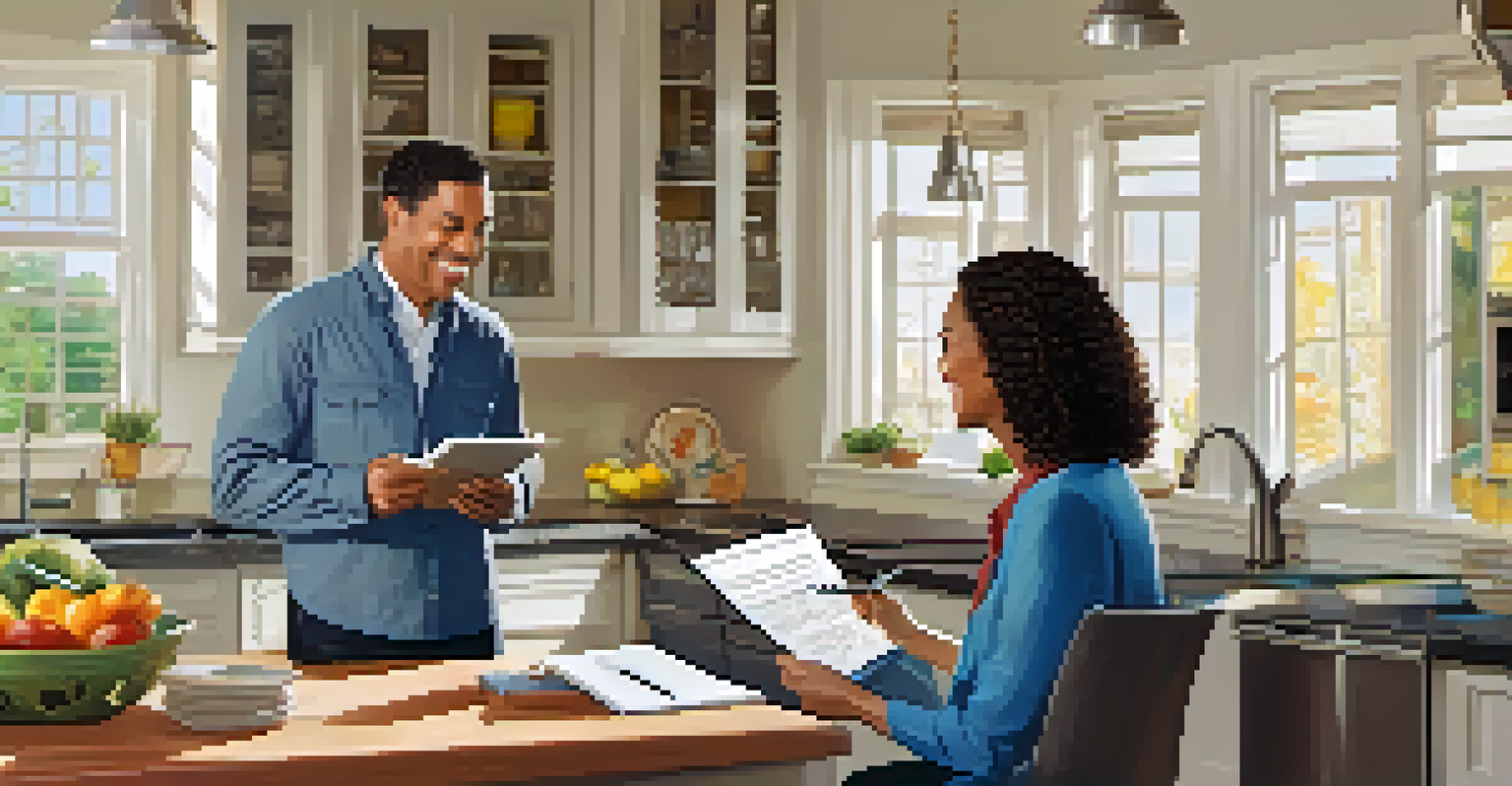Creating a Welcoming Atmosphere for Home Inspectors

Understanding the Importance of a Welcoming Atmosphere
Creating a welcoming atmosphere for home inspectors is crucial for a successful inspection. When inspectors feel comfortable, they are more likely to conduct thorough evaluations, which ultimately benefits the homeowner. A positive environment fosters good communication, ensuring that any concerns are addressed promptly.
A warm smile is the universal language of kindness.
Moreover, a friendly atmosphere can alleviate some of the tension that homeowners may feel during the inspection process. It’s natural to be anxious about what an inspector might find, but a warm welcome can help ease those nerves. When both parties are relaxed, the interaction becomes more collaborative.
Ultimately, a welcoming environment sets the tone for the entire inspection. As a homeowner, investing time in creating such an atmosphere pays off in the form of a smoother inspection experience and a more comprehensive report.
Preparing Your Home for the Inspection
Preparation is key to creating a welcoming atmosphere for home inspectors. Start by decluttering your home to make it easier for the inspector to navigate through each room. A clean, organized space not only shows that you care about your home but also allows the inspector to do their job more efficiently.

Additionally, consider making necessary repairs before the inspection. If there are minor issues, like leaky faucets or squeaky doors, fixing them beforehand can leave a good impression. It demonstrates that you are proactive and attentive to your home’s needs.
Create a Welcoming Atmosphere
A friendly environment helps inspectors feel comfortable, leading to thorough evaluations and smoother communication.
Lastly, ensure that all areas of the home are accessible. Move any furniture or items that might obstruct access to crucial areas like the attic, basement, or utility rooms. This preparation not only helps the inspector but also reflects your willingness to cooperate.
Creating a Friendly Environment During the Inspection
Once the inspector arrives, greet them warmly and introduce yourself. A simple handshake and a smile can go a long way in creating a friendly atmosphere. This initial interaction sets the stage for a positive relationship throughout the inspection process.
The greatest gift of human beings is that we have the power of empathy.
During the inspection, it’s helpful to maintain open lines of communication. Feel free to ask questions about the inspection process or any areas of concern you might have. This engagement shows the inspector that you are interested and invested in their findings.
Offering refreshments, like water or coffee, can also enhance the atmosphere. It’s a small gesture that can make the inspector feel more at home, allowing for a more relaxed and productive inspection.
Being Respectful of the Inspector's Process
While it’s important to be friendly, it's equally crucial to respect the inspector's process. Home inspectors often have a specific routine they follow to ensure a thorough evaluation. Interrupting or hovering can disrupt their concentration and hinder their efficiency.
Instead, allow them the space they need to do their job while remaining available for questions. Letting them know that you’re there if they need anything strikes a balance between being helpful and respectful. This shows you value their expertise.
Prepare Your Home Effectively
Decluttering and making necessary repairs demonstrate your attentiveness and help inspectors navigate your home with ease.
Remember, the goal is to have a comprehensive inspection. By respecting their process, you're contributing to a more effective evaluation of your home, which benefits everyone involved.
Addressing Concerns Openly and Honestly
Home inspections can sometimes uncover issues that can be hard to discuss. If you have concerns about any part of your home, it's best to address them openly with the inspector. Being transparent about known issues allows the inspector to focus on those areas, leading to a more thorough assessment.
Honesty creates an environment of trust, which is essential for effective communication. If the inspector knows you’re forthcoming about your concerns, they’ll be more likely to engage with you about the findings and offer solutions. This collaborative approach is beneficial for both parties.
When the inspection is finished, discussing the findings in a frank manner can also help you understand what needs attention. This open dialogue can guide you on the next steps to take, ensuring that your home remains in good condition.
Following Up After the Inspection
Once the inspection has wrapped up, it’s courteous to follow up with the inspector. A simple thank you note or email can make a lasting impression. It shows appreciation for their effort and reinforces the positive relationship you’ve built during the inspection.
If the inspector provided recommendations or insights, consider reaching out with any questions you might have. This continued communication not only helps clarify any doubts but also shows that you value their expertise and care about your home’s condition.
Engage Respectfully During Inspections
Maintaining open communication while respecting the inspector's process fosters a collaborative relationship that benefits everyone.
Additionally, if you found the inspector's service helpful, don’t hesitate to recommend them to friends or family. Word of mouth is powerful, and sharing your positive experience can benefit both you and the inspector.
Using Feedback to Improve Future Inspections
After the inspection, reflect on the experience and consider any feedback you received. If the inspector pointed out areas for improvement regarding your home or the inspection process, take this advice to heart. It can help you create an even more welcoming environment for future inspections.
Moreover, think about how you can enhance the experience for the next inspector. Perhaps it’s improving access to certain areas or ensuring that your home is even tidier. Each inspection is an opportunity for growth, not just for your home but also for your approach as a homeowner.

Implementing feedback can also positively impact the overall perception of your home when it comes time to sell. A well-prepared home leaves a great impression, making it easier to attract potential buyers.